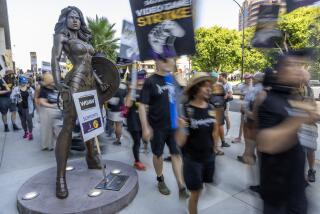Actors Unions Strike Makers of Television, Radio Commercials
Two major performers’ unions struck makers of radio and television commercials Monday, and picket lines went up on both coasts. A spokesman for the advertisers vowed to continue production with non-union talent.
The strike by the Screen Actors Guild and the American Federation of Television and Radio Artists was the second major walkout in the entertainment industry this month. The Writers Guild of America struck motion picture and television producers and the three major television networks on March 7, and that dispute continued Monday with no new negotiations scheduled.
Picket lines in the newest strike went up Monday morning outside the Ogilvy & Mather advertising agency in Los Angeles and at General Motors in New York. General Motors was targeted because it is a major advertiser. Picketing is scheduled in Chicago, Miami and Honolulu later this week, a spokesman for the striking actors said. Picket lines will resume here and in New York Friday if negotiations remain stalled, he added.
Contract talks between performers and advertisers broke off two weeks ago and no further talks are scheduled. A spokesman for the Screen Actors Guild said Monday that the performers’ unions are ready to return to the bargaining table as soon as possible, however.
Some advertisers said they were halting production because of the strike. But John A. McGuinn, chief negotiator for management, said advertisers were being advised to use non-union performers.
“We’re producing commercials today; we’re producing commercials tomorrow; we don’t see any problem (during a strike). We have non-union talent that’s willing to work. Our doors are open,” said McGuinn, who represents the joint policy committee of the two major advertising groups involved in the dispute--the American Assn. of Advertising Agencies and the Assn. of National Advertisers. The organizations represent producers of commercials and advertisers for whom the commercials are produced.
The major unresolved issue is that of residual payments for performers in commercials appearing on cable TV. Under the old contract, the advertiser paid a flat fee of $1,000 to reuse the commercial, and no further payment was due the performer for playing that commercial on cable.
“Our concern is that their (the commercial makers’) refusal to move on this position is an attack on the basic residual (payment) structure, and that’s crucial to anybody’s survival in this age of technology,” said Dick Moore, public relations counsel for AFTRA.
McGuinn called the unions’ demands “outlandish,” adding that the advertisers’ most recent offer to pay the performer a session fee of $333.25 for 13 weeks of cable use should be adequate compensation. “A single-session fee is plenty (because) the ratings for a cable show are minimal to non-existent,” compared to network programs.
During the strike, the performers’ unions will offer interim contracts to some advertisers who agree to abide by the terms of the unions’ most recent contract proposal. The unions notified all potential presidential candidates that they may continue their campaign advertising under such an agreement.
Campaign advertising is relatively immune to the strike because it uses little union talent and is not affected by residual issues, anyway, according to political consulting firms. “Since political commercials have a half-life of a month, maybe even a week, I don’t expect to have to worry too much about a strike,” said one Washington-based advertising consultant who asked that his name not be used.
The advertising community had mixed reactions to the strike. Peter Stranger, president of the Los Angeles office of the New York advertising firm Della Femina, Travisano & Partners, said the company scrambled to get some ads completed early, but will probably be unable to go ahead with new ads for one of its major clients, Isuzu, because the actor who plays the part of the notorious liar, Joe Isuzu, is a guild member.
“Of course, we could put out a call for Joe Isuzu look-alikes,” Stanger joked. “But that might get confusing. We’d have one liar playing the part of another.”
Times staff writer Bruce Horovitz in Los Angeles and researcher Eileen Quigley in New York also contributed to this story.
More to Read
The biggest entertainment stories
Get our big stories about Hollywood, film, television, music, arts, culture and more right in your inbox as soon as they publish.
You may occasionally receive promotional content from the Los Angeles Times.










